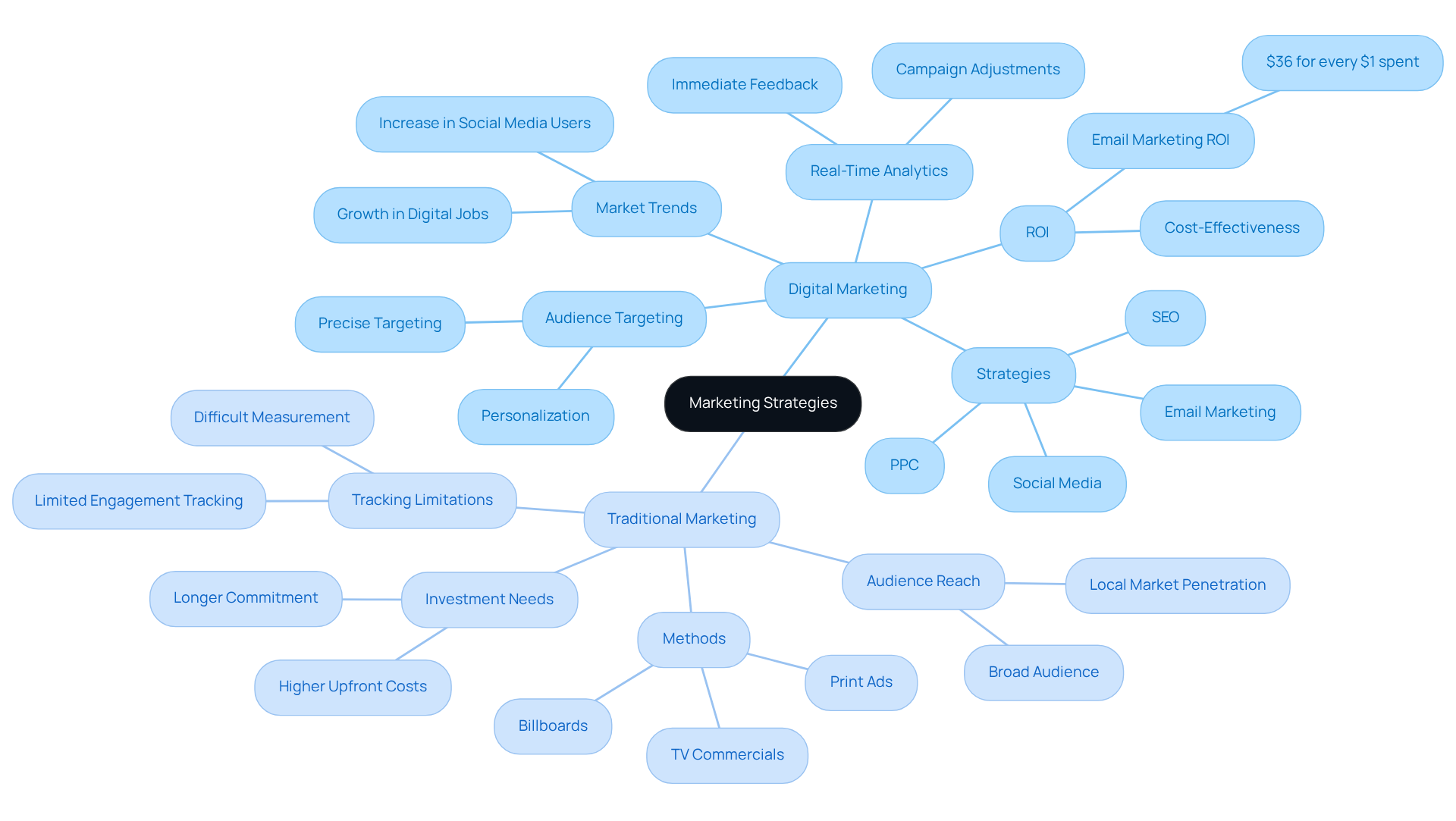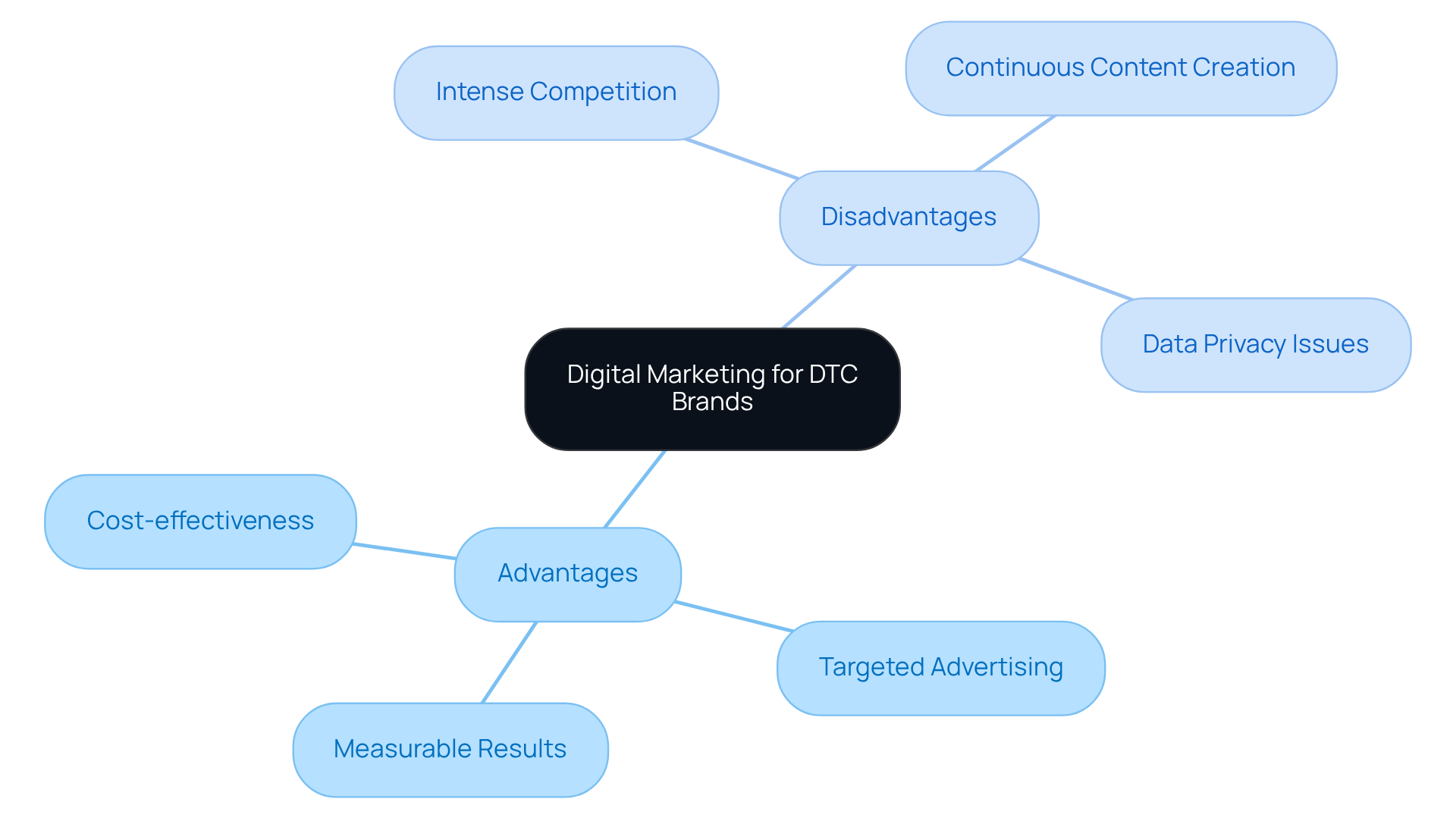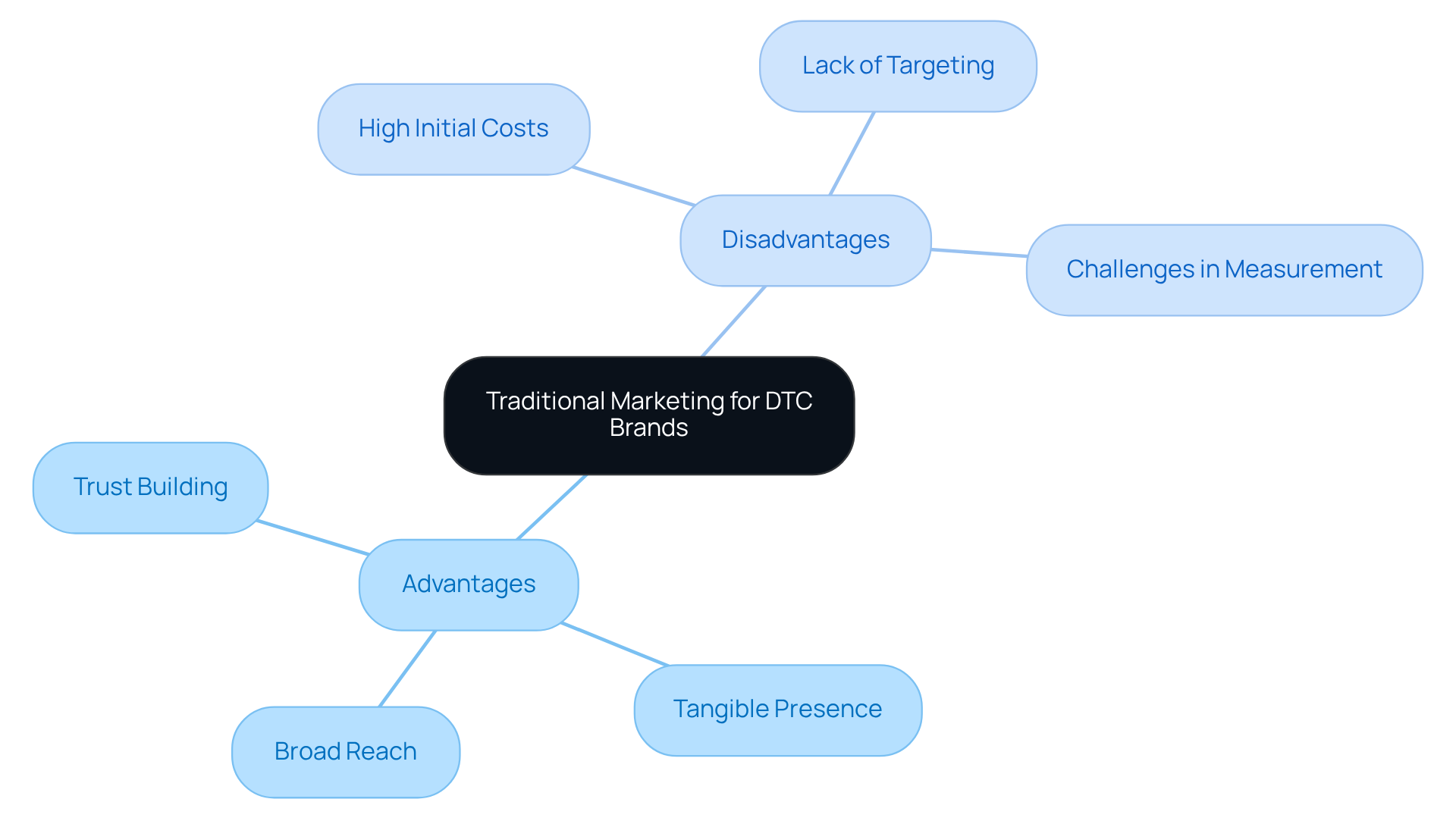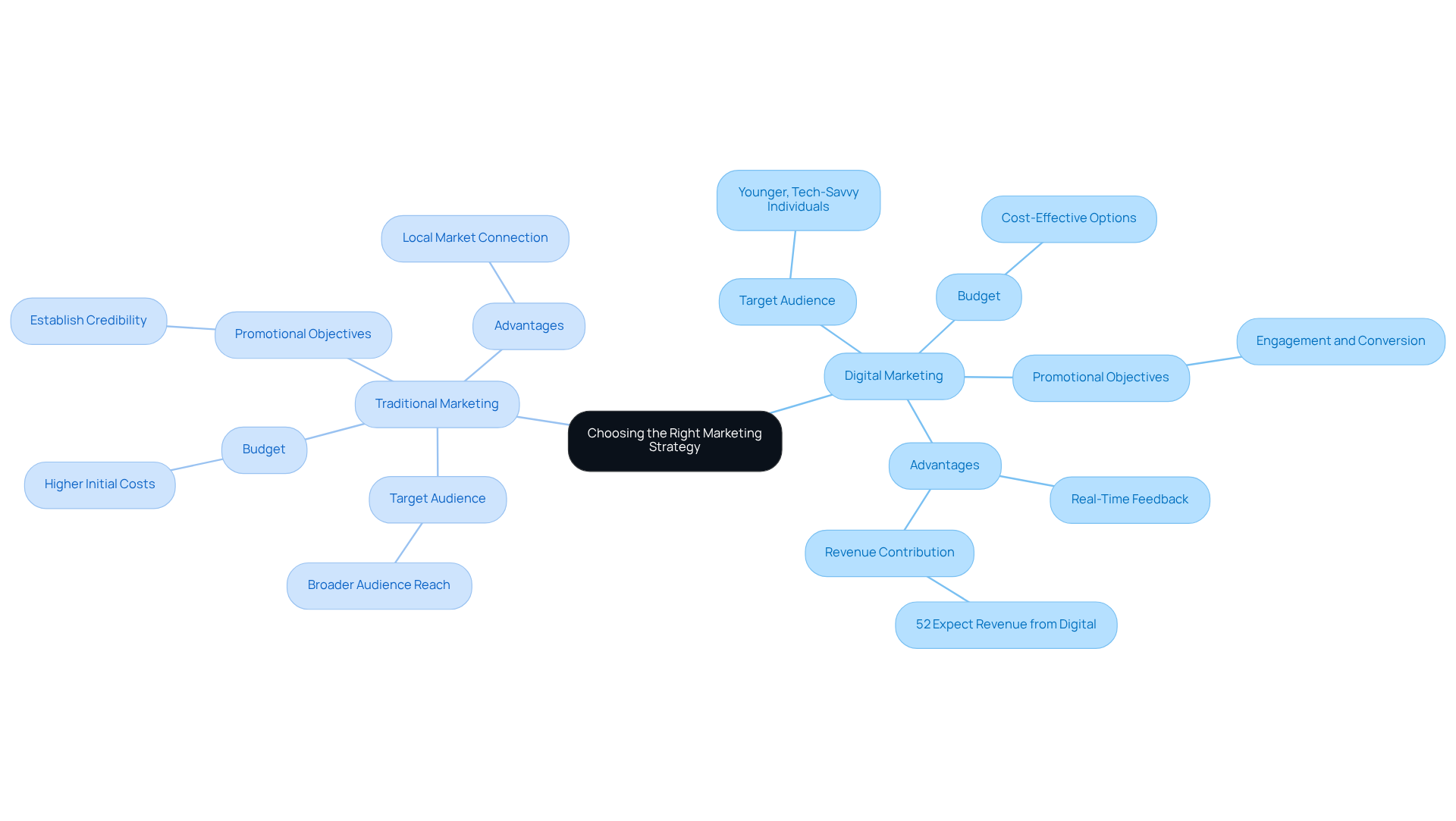
Overview
Digital marketing agencies demonstrate unparalleled expertise in crafting strategies tailored for direct-to-consumer (DTC) brands. By leveraging online platforms for targeted advertising and utilizing real-time analytics, these agencies significantly enhance engagement and return on investment (ROI). Notably, digital marketing's inherent adaptability and cost-effectiveness—especially through channels such as social media and email marketing—underscore its critical role for DTC brands striving to excel in a fiercely competitive environment.
Introduction
The marketing landscape is experiencing a seismic shift as direct-to-consumer (DTC) brands confront the critical choice between digital and traditional strategies. Digital marketing agencies have emerged as pivotal players, offering innovative approaches that significantly enhance audience engagement and deliver measurable results. As competition intensifies and consumer behaviors evolve, DTC brands must navigate this dichotomy effectively to maximize their growth potential. This article explores the advantages and disadvantages of both marketing methods, providing valuable insights that empower brands to make informed decisions in an increasingly digital world.
Understanding Digital Marketing vs. Traditional Marketing
the field by encompassing a wide range of strategies that leverage the internet and electronic devices, including social media, email, search engines, and websites. This contemporary approach adopted by [digital marketing agencies top](https://specialtyfabricsreview.com/2025/03/17/traditional-marketing-vs-digital-marketing-in-2025) allows for and real-time analytics, enabling brands to measure campaign effectiveness immediately. In contrast, conventional promotion relies on offline methods such as print ads, television commercials, and billboards. While traditional promotion can reach a broad audience, it often falls short in .
For direct-to-consumer (DTC) companies, the decision between these two approaches is vital, as digital marketing agencies top their efforts with online promotion that not only provides enhanced options for personalization but also fosters . With 4.95 billion active internet users worldwide and forecasts suggesting that by 2025, social media platforms will have over 5 billion users actively interacting with brands, the opportunity for DTC brands to engage with their audience through digital marketing agencies top is immense.
Furthermore, email promotion alone boasts an impressive , underscoring the efficiency of digital marketing agencies top online strategies. Digital marketing agencies top the market by offering more affordable digital promotion with trackable ROI compared to .
As we approach 2025, the environment will continue to evolve, with 44% of firms emphasizing a tech-first strategy, making online promotion increasingly essential for DTC enterprises striving to thrive in a competitive market, supported by digital marketing agencies top. Experts assert that the appropriate promotional mix, when utilized by digital marketing agencies top and aligned with business objectives, is crucial for maximizing growth and engagement.
Successful DTC companies are already leveraging online promotion tactics through the digital marketing agencies top to enhance their visibility and customer connections, setting a benchmark for others to follow. For instance, has achieved a 36% rise in ROI on advertisements for their clients, showcasing the top can provide through effective online promotion.

Advantages and Disadvantages of Digital Marketing for DTC Brands
Digital promotion, supported by top, presents a wealth of advantages for , including cost-effectiveness, , and . By leveraging social media platforms and search engines, digital marketing agencies top can help brands precisely reach , enabling tailored messaging that resonates strongly with their audience. Moreover, digital marketing agencies top can adjust in real-time based on performance metrics, which significantly .
However, the digital landscape is not without its challenges. The intense level of competition demands continuous content creation, and brands must also contend with potential issues surrounding . Navigating these complexities is essential for DTC companies as they harness the advantages of digital strategies to propel growth.

Advantages and Disadvantages of Traditional Marketing for DTC Brands
presents distinct advantages, including broad reach and the establishment of a tangible presence through print media and events. These methods effectively foster recognition and build trust among consumers who may not be as engaged online.
However, the drawbacks are significant. often necessitates a larger initial expenditure and lacks the that provides. For instance, while direct mail can achieve an average response rate of 9 percent for house lists, the overall effectiveness of conventional methods can be challenging to quantify, complicating budget justification for .
Furthermore, with projected to reach $740 billion USD in 2024, the competitive landscape underscores the need for quantifiable engagement. As promotional strategists emphasize, the greatest risk of relying solely on is the potential for irrelevance in a rapidly evolving online environment.
Consequently, while traditional promotion can enhance visibility, it may not consistently deliver the same levels of engagement or conversion as online strategies, particularly in a market where is fleeting and frequently diverted by online alternatives. Additionally, the integration of AI into conventional media purchasing is , making it imperative for DTC companies to adapt to these changes to maintain competitiveness.

Choosing the Right Marketing Strategy: Digital vs. Traditional for DTC Brands
When choosing between online and conventional promotion, must carefully evaluate their target audience, budget, and . is often more suitable for businesses aiming to engage younger, tech-savvy individuals who spend significant time online. A recent report reveals that 52% of respondents estimate that 41% or more of their annual revenue will derive from , underscoring the significance of this approach. Digital promotion facilitates real-time feedback and adjustments, making it ideal for companies that prioritize .
Conversely, may prove more effective for businesses seeking to establish credibility and connect with a broader audience, particularly in local markets. Ultimately, a that integrates both methods may yield optimal results, allowing DTC companies to harness the strengths of each approach while mitigating their weaknesses.
As Neil Saunders, Managing Director of Retail at GlobalData, notes, "The most successful companies in the near future will be those willing to adapt and respond swiftly to ." This adaptability is crucial for sustained growth and relevance in today's competitive landscape, especially as DTC brands encounter rising and the imperative to meet benchmarks of at least 100,000 website visitors and 2,000 purchases per month.

Conclusion
Digital marketing emerges as a pivotal element for direct-to-consumer (DTC) brands, delivering a dynamic and measurable approach that traditional marketing often lacks. By harnessing the extensive reach of online platforms, digital marketing agencies craft tailored strategies that empower brands to engage directly with their target audiences, cultivating stronger connections and driving substantial ROI.
This article underscores the myriad advantages of digital marketing, including cost-effectiveness, precise targeting, and real-time analytics, which are indispensable for DTC brands maneuvering through a competitive landscape. While traditional marketing methods can bolster brand recognition, they frequently fall short in terms of measurable outcomes and adaptability. The insights presented highlight the necessity of a hybrid strategy that amalgamates the strengths of both digital and traditional marketing to optimize growth and enhance engagement.
As the marketing landscape continues to transform, DTC brands must remain agile and receptive to integrating innovative strategies that resonate with their audiences. Embracing digital marketing transcends being a mere trend; it is a fundamental requirement for brands aspiring to excel in an increasingly digital world. The call to action is unequivocal: prioritize digital strategies to ensure sustained relevance and success in the marketplace.
Frequently Asked Questions
What is the main difference between digital marketing and traditional marketing?
Digital marketing utilizes online strategies such as social media, email, search engines, and websites, allowing for precise audience targeting and real-time analytics. Traditional marketing relies on offline methods like print ads, television commercials, and billboards, which are less effective in tracking engagement and return on investment (ROI).
Why is digital marketing important for direct-to-consumer (DTC) companies?
Digital marketing offers DTC companies enhanced options for personalization and fosters direct consumer engagement, making it vital for their marketing strategies. With a growing number of internet users, DTC brands have significant opportunities to connect with their audience online.
What is the ROI of email marketing compared to traditional marketing?
Email marketing has an impressive average ROI of $36 for every $1 invested, highlighting its efficiency compared to traditional marketing strategies, which often require higher upfront investments and provide less trackable ROI.
How are businesses adapting to the changing marketing landscape?
As we approach 2025, 44% of firms are emphasizing a tech-first strategy, making online promotion increasingly essential for DTC enterprises aiming to thrive in a competitive market.
What role do digital marketing agencies play in the success of DTC companies?
Digital marketing agencies help DTC companies enhance their visibility and customer connections through effective online promotion tactics, which are crucial for maximizing growth and engagement.
Can you provide an example of a successful digital marketing campaign?
Parah Group is an example of a successful digital marketing agency that achieved a 36% rise in ROI on advertisements for their clients, demonstrating the tangible advantages of effective online promotion strategies.
FAQs











